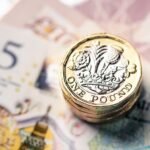Unlock the Editor’s Digest for free
Roula Khalaf, Editor of the FT, selects her favourite stories in this weekly newsletter.
Sterling rose to its highest level against the dollar in almost a year on Thursday after the UK economy grew more than expected in May while lower than forecast US inflation drove a broad retreat in the greenback.
The pound was up 0.7 per cent at $1.2941, the highest level since late July 2023, after data showed the UK economy grew 0.4 per cent, having flatlined in April, in an early boost to the new Labour government, which has declared growth its “national mission”.
The British currency was also lifted by a broader decline in the dollar after US inflation came in below expectations in June at 3 per cent. That pushed the dollar down 0.8 per cent against a basket of six currencies.
“The pound has been supported by the release of further evidence revealing that the UK economy is recovering more strongly than expected,” said Lee Hardman, currency analyst at MUFG.
Traders in swaps markets are now evenly split on the likelihood of a Bank of England rate cut next month. Earlier this week, they had been pricing in a two-thirds likelihood, before BoE chief economist Huw Pill suggested that he was not yet ready to change his vote in favour of a rate cut.

Sterling’s strength comes in the first week of a new Labour government, which investors have welcomed over hopes of a new era of relative political stability.
This week, Rachel Reeves, the chancellor, set out far-reaching proposals on planning reforms to “fix the foundations of Britain’s economy” and “get Britain building again”.
“Simply shifting the narrative towards a more energetic drive for change could, on the margin, be helpful for both investment and growth,” said Shahab Jalinoos, global head of foreign exchange research at UBS Investment Bank.
He added that the UK now had “arguably the most stable government in the G7 over the next five years”, so sterling “should finally see the tide of structural flows move in its favour for the first time in the post-Brexit-vote era”.
The pound’s strength comes after a snap election in France spooked investors and resulted in a hung parliament that has weighed on the euro.
This week, the Investment Institute at BlackRock — the world’s largest asset manager — moved its tactical position on UK stocks from “neutral” to “overweight” in the belief that “political stability and a growth pick-up could improve investor sentiment”.
Michael Metcalfe, head of macro strategy at State Street, one of the world’s largest custodian banks, said recent positivity had prompted asset managers to eliminate their underweight in the UK currency this quarter, with neutral positioning leaving “plenty of room for further sterling strength”.















